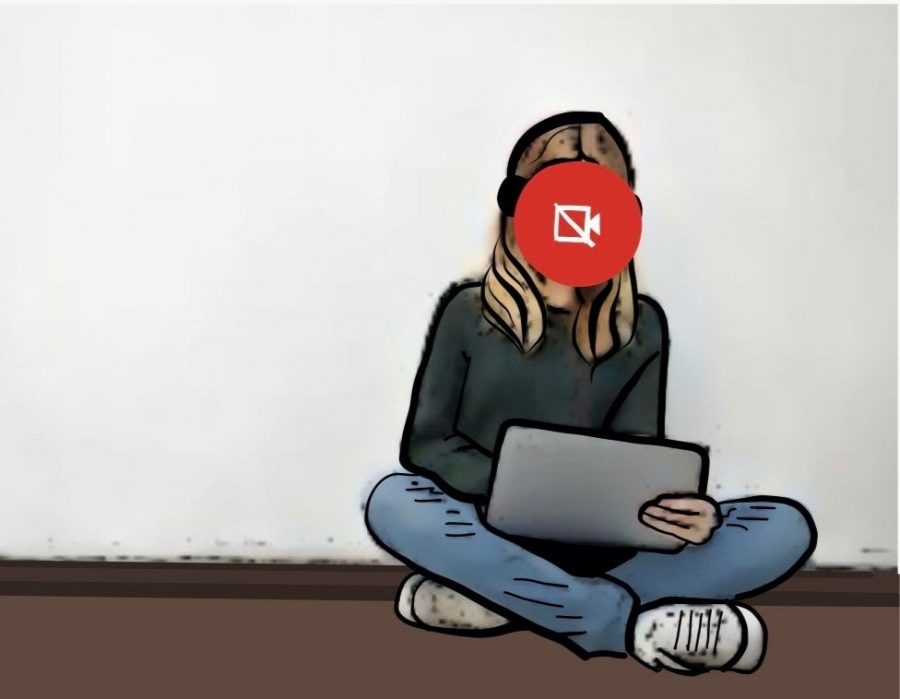Comfort Over Cameras: Why students prefer keeping cameras off
December 11, 2020
If there is one positive thing distanced learning has brought, it is the guaranteed comfort of bringing school to our own home. Just think about it: days are simply started by logging onto class, with the help of a few clicks. No need for the typical morning routines, just a kick off the bed, and we’re off to start school from the convenience of our rooms. There is, however, one particular factor hindering the complete fulfillment of our coziness— cameras.
Five months into the implementation of online school has definitely changed students’ perspectives of the new learning environment. Many students began to gradually soak into the comfort that the circumstances created, with the combination of school and home.
“I didn’t feel like combing my hair, or washing my face, or putting a shirt on, or having a teacher yell at me [because] I’m not looking at the screen,” junior Roland Castillo said. “I don’t think [cameras] are necessary.”
By turning off your camera, it was as if you were free to unwind in any way fit, without feeling the need to be judged for your appearance, or what your background looked like.
“It’s probably because we haven’t seen anyone in months, so we are worried about how we look and our surroundings,” senior Noemi Mirabella said.
According to an Instagram poll conducted by the Grizzly Growler, 87% out of nearly 200 students preferred to keep their camera off; the most common reason being that they favored the privacy and comfort .
“Inviting an entire class to very easily look into your room or wherever you’re doing is concerning,” junior Issac Jimenez said. “It can be uncomfortable and can feel kind of like an invasion of privacy.”
Separate circumstances at home, or student home life, was also a contributing factor to the lack of virtual presence in terms of showing themselves in the classroom. The likelihood of anything happening at any given moment, stressed the consequence of creating disruption to the class and to teachers.
“There was a time when I was talking to one of my teachers and my brother came into the room while he was singing and dancing. It caught me off guard and I was embarrassed,” junior Mikhaela Cueto said. “My brother not only humiliated me but himself too. I felt sorry for my teacher too as they had to witness that scene.”
Student insecurity, appearance and environment-wise, seems like an inevitable feeling even when engaged in the normal face-to-face setting at school. Virtual learning easily grants the opportunity for students to choose when and how they want to be seen. While some decide to go completely unnoticed, others find that bandwagoning the camera-on/ camera-off option affected their decisions.
“I personally keep mine off as I often feel embarrassed if I’m the only one with it on,” senior Marcelle Chua said. “I think if more students turn theirs on, then many would turn theirs on too.”
For some students, facing this common issue was a manner of accepting the circumstances through confidence. By turning on their cameras, as what freshman Jean Pierre Hernandez chose, students can create a more comfortable environment in the virtual classroom as well.
“I turn on my camera every day, in probably 6 out of my 8 classes, and I do it because I feel comfortable, and confident enough for people to see my background, and my face, or how I talk,” Hernandez said.
Although the beginning of his highschool experience began in an “uncomfortable” sense, due to facing the unknowing fact of what some of his classmates are like, Hernandez states that confidence is the key motivator to interaction.
“I would encourage other students to turn on their camera because that would build some trust between the students and teachers,” he said.
Others share a similar mindset to Hernandez when it comes to leaving cameras on. It’s viewed, rather, as a simple act of gratitude towards teachers in order to compensate for the lack of interaction. Senior Saraí Ortiz, pridefully sporting pajama pants and a sweatshirt to class, states that she still keeps a professional demeanor even when lying in the comfort of virtual school.
“If students truly understand that teachers are struggling as well in this environment, participation will increase,” Ortiz said.
School is naturally bound by the relationships between students and teachers, so showing empathy is an aspect that should be accounted for by both. It is nevertheless important to note that prevalent factors, like mental health, remain a contributor to how students display their virtual presence.
“During the first couple weeks of school I found that having my camera on triggered my anxiety tics and that I wasn’t able to focus as much, even though I was looking at the screen,” senior Kathleen Guzman said.
Despite common assumptions, some students actually remain focused off-camera, but aim to drive away class attention through minor and personal habits.
“I have ADHD so I need something to fidget with, so I tend to play with something in my hands. I manage to stay focused,” junior Joseph Steven said.
The general argument of why students keep their cameras on or off, is simply due to the certainty of comfort. While it comes down to the student’s choice, virtual presence remains a challenge to all those involved.



